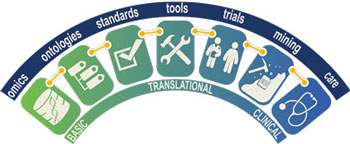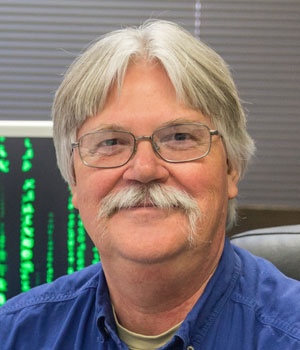The University of Iowa is among nine institutions that were collectively awarded a five-year $25M grant from the National Center for Advancing Translational Science (NCATS) to create a new CTSA Program National Center for Data to Health (CD2H).
This award will coordinate informatics activities across the Clinical and Translational Science Awards (CTSA) Program—a network of over 60 institutions—to provide collaborative clinical and translational research infrastructure.

The CTSA Program National Center for Data to Health will focus on creating and harnessing an ecosystem for translational scientists to discover and share their software, data, and other research resources within the CTSA Program network. Collaborative innovation serves as a strong foundation to support mechanisms to facilitate training, engagement, scholarly dissemination, and impact across the CTSA Program hubs and beyond.
The UI will work with the following institutions on the project: Oregon Health & Science University, Northwestern University, University of Washington, Johns Hopkins University School of Medicine, and Sage Bionetworks, The Scripps Research Institute, Washington University in St. Louis, and The Jackson Laboratory.
The CD2H will be tasked with supporting an evolving informatics ecosystem, enhancement of a collaborative informatics community, development of Good Data Practice (GDP), and growth of collaborative innovation across informatics tools, methods, and processes.
UI Associate Professor David Eichmann, lead investigator for the Iowa CD2H team, will lead the CD2H People, Expertise, and Attribution team, which supports attribution and inventorying of expertise and CTSA activities.
Eichmann will capitalize on his CTSAsearch online research profiling system, which has been supported in part by a separate grant from the National Center for the Advancement of Translational Science. According to Eichmann, CTSAsearch provides “an integrated web of scientific co-authorship.”
“We will be doing in

formation fusion across various scattered sources and creating a discovery system to allow people to identify potential resources and collaborators,” says Eichmann, director of the School of Library and Information Science (SLIS) and a subprogram director of the Interdisciplinary Graduate Program in Informatics.
Patrick Barlow, associate director for program evaluation at the UI’s Institute for Clinical and Translational Science, will work on CD2H’s evaluation team.
“As a program evaluator, I will work together with a program or project's leadership to find ways to measure what the program is doing, how it is meeting its targeted goals, and how can it improve,” says Barlow, assistant professor of internal medicine in the Carver College of Medicine.
“This CTSA program is extremely timely and we are excited to play a critical part in using informatics to bring our institutions together to advance clinical and translational science,” says Patricia Winokur, Iowa’s CTSA primary investigator and director of the Institute for Clinical and Translational Science. “The CTSA consortium includes over 60 institutions and each of us has a variety of data sets and systems that need to learn to talk to each other.”
CTSA changes the face of scientific teamwork
The CD2H will be led by Melissa Haendel (Oregon Health & Science University), Kristi Holmes (Northwestern University), Sean Mooney (University of Washington), Chris Chute (Johns Hopkins University School of Medicine), and John Wilbanks (Sage Bionetworks).
“The goal is to unlock the amazing wealth of technologies and innovation located within each individual CTSA and to create cohesive communities of practice founded on the fundamental premise that team science, data sharing, and collaborative innovation can advance patient care,” says Haendel, center director at Oregon Health & Sciences University.
Holmes, director of evaluation at the Northwestern University Clinical and Translational Sciences Institute, is enthusiastic about the project.
“As scientific research is transformed by big data, high-performance computing, and real-time publishing, the structure and composition of scientific teamwork is also changing,” Holmes says. “Here we aim to grow the informatics-based architecture needed to support interdisciplinary teams so that diverse contributions are valued and recognized--enhancing knowledge transfer, discovery, and impact on health.”
The new CTSA Program National Center for Data to Health is supported by the National Center for Advancing Translational Sciences (NCATS) at the National Institutes of Health (Grant U24TR002306).